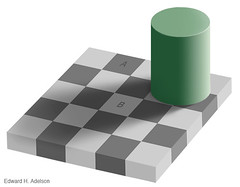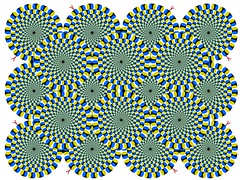Artificial Intelligence Class
My professor showed some everyday instances that we take for granted and convincingly show why it is hard to get a machine to behave like a human being. Naturally, he showed some rather interesting optical illusions. Since they are optical illusions, is there any need to replicated this behavior in an intelligent and rational agent? After all, are they any benefits for seeing these illusions? Does seeing these illusions make humans more intelligent? Or does it suggest a deeper understanding of how the human mind really works? Well, before this gets too philosophical, it would be wise to get back to the point and show you some of the examples that I find interesting.
Because I am afraid that the links might actually go missing, I have uploaded the pictures to my flickr account and gave proper credits to the authors. Most of these are also available from the Mind Hacks book which I have been trying hopelessly to finish. Whenever possible, the images link back to the original image on their respective websites. If anyone feels that I have violated their copyright, I will gladly remove these pictures.

Why does it appear correct when viewed upside down but totally wrong when viewed the right side up?
A and B have the same color and shade! Don't believe me? Click here. This is called the Adelson Checker Shadow Illusion.
You have to click on it to see the BIG version for the illusion to work.
Another interesting thing I have learned are Garden Path Sentences. Here are some of the more interesting ones that are hard to decipher.
- Fat people eat accumulates.
The fat (animal fat, vegetable fat, etc) that people eat accumulates in their bodies. - The prime number few.
The prime (or the prime numbers e.g. 2, 3, 7, 11) amount to only a few. -
The player kicked the ball kicked the ball.
The player was given the ball by someone who kicked it to him. The player then kicked the ball back.
Well, that was an interesting first lecture for that class. Maybe there are more illusions worth sharing later as well.
Tweetcomments powered by Disqus